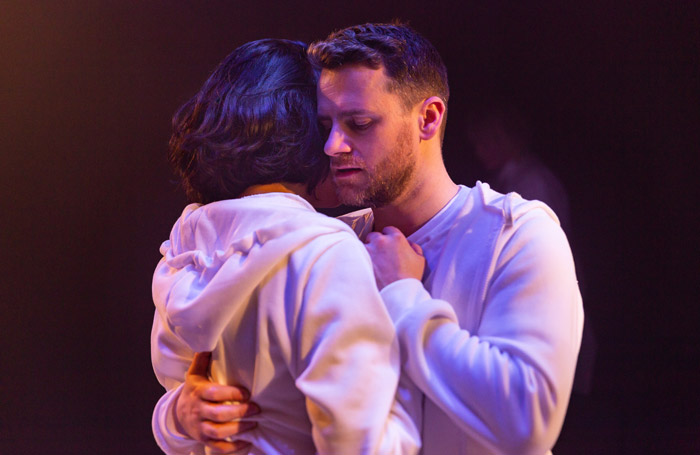The Other Room’s Lovesick season concludes with Lucy Prebble’s The Effect, an exploration of love, sanity and the limits of medicine. Much can happen in neuroscientific research over six years and this 2012 play feels a little dated as a result.
Set in traverse with a characteristically detailed set by Carl Davies, artistic director Dan Jones’ production is lively and often humorous. Connie (Hussina Raja) and Tristan (Neal McWilliam) meet under laboratory conditions. From divergent backgrounds and with different motives for being there (one for money, the other out of academic interest), they fall in love. Or do they? Nicola Reynolds as psychiatrist Lorna, administers increasing strengths of a dopamine-agonist in a study into the physical and psychological effects of the hormone on states of depression. She in turn is overseen by Toby, her senior (Jâms Thomas), a morally ambiguous yet experienced researcher and veteran of the conference circuit, who carries his father’s brain in a bucket. While Connie and Tristan are enveloped in lustful passion characteristic of the early stages of love, Toby and Lorna argue over the causes of depression. Is it a chemical imbalance that can be remedied by medication or a natural reaction to external factors? Do “so-called depressed people have a more accurate view of the world”? For Lorna, who herself has experienced depression, the difference is of fundamental importance.
Hussina Raja and Neal McWilliams
Prebble asks if our sense of autonomous self can ever be more than the chemical effect of our neurochemistry. It is commonly accepted that the brain in love shows near identical neural activity to that of an addict requiring a fix. As for depression, post-2012 studies continue to confirm the link between our environment, diet and depression. Even our own imaginations can affect hormone levels (the fantasy image we create of our lover is often rather different to reality and the term ‘love is blind’ is firmly confirmed by studies of neural activity).
“I can tell the difference between who I am and a side effect”
The freneticism of act one is superseded in act two by an unexpected poignancy. Whilst Lorna’s and Tristan’s all-consuming descents are triggered by external factors, Toby and Connie’s responses seem internalised and self-realised
“I have made a space in my brain for you and I like it”.
Ultimately, one must not confuse the validity of the source of our emotional responses with the validity of their effect.
Jo Fletcher’s parallel arrays of lights above Davies’ stark white set, cleverly reconstructs an MRI flash; Davies’ techn-packed set displays heart rate and blood pressures of the test subjects; Tic Ashfield’s music and sound does all the right things. It all adds up to being very clever stuff.
Raja is particularly fine as Connie, displaying an easy naturalness, attentiveness and versatility. McWilliams’s characteristic style of performance is a little out of balance here, though his commitment cannot be knocked. Reynolds and Thomas put in solid performances as one might expect.
The Effect is a fitting end to Dan Jones’ first season as The Other Room’s Artistic Director.
It concludes on 12th May
